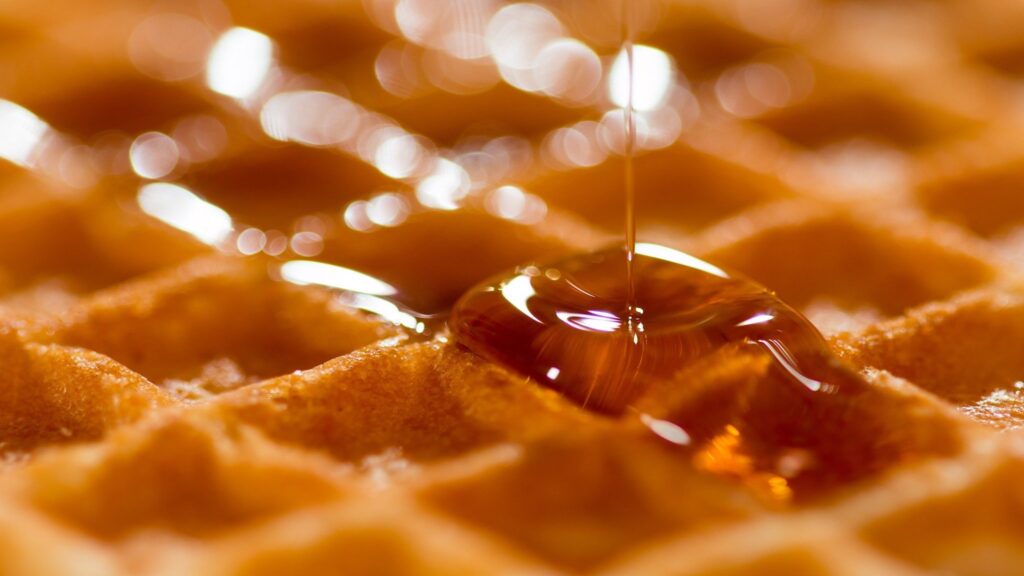
Before you dig in to your next stack of French toast or waffles, you might want to pour on pure maple syrup.
That’s because University of Rhode Island researcher Navindra Seeram, who specializes in medicinal plant research, has found more than 20 compounds in maple syrup from Canada that have been linked to human health, 13 of which are newly discovered in maple syrup. In addition, eight of the compounds have been found in the Acer (maple) family for the first time.
The URI assistant professor of biomedical and pharmaceutical sciences in URI’s College of Pharmacy presented his findings March 21 at the American Chemical Society’s Annual Meeting in San Francisco. The project was made possible by Conseil pour le développement de l’agriculture du Québec (CDAQ), with funding provided by Agriculture and Agri-Food Canada’s Advancing Canadian Agriculture and Agri-Food (ACAAF) program.
Several of these anti-oxidant compounds newly identified in maple syrup are also reported to have anti-cancer, anti-bacterial and anti-diabetic properties.
Prior to the study, the Federation of Quebec Maple Syrup Producers already knew that its product was full of naturally occurring minerals such as zinc, thiamine and calcium. But it enlisted Seeram to research the presence of plant anti-oxidants. The Federation awarded Seeram a two-year, $115,000 grant with the help of the CDAQ and Agriculture and Agri-Food Canada. His research continues to determine if the compounds exist in beneficial quantities.
Serge Beaulieu, president of the Federation of Quebec Maple Syrup Producers, said Seeram’s lab is but one in an expanding multi-national network of research facilities dedicated to the study of maple products from Canada.
“We are proud that our producers are generously supporting this research, bringing to light a greater understanding of the gastronomic and health benefits of maple products. It is not just for Canada, but for the welfare of consumers around the world,” Beaulieu said.
Geneviève Béland, federation marketing director, said the group has learned that maple products are much more than sugars with only calories to contribute.
“Recent research findings, such as those by Dr. Seeram, reveal a whole array of bioactive compounds that promise to offer many health benefits,” she said. “Our journey to understanding these benefits has just begun.”
Seeram, who was named the 2009 Young Scientist of the Year by the American Chemical Society’s Division of Agricultural and Food Chemistry, said his goal is to educate the research community and the public about the many benefits of a variety of plant and berry foods, as well as natural products. His message is receiving widespread attention. Seeram had two of the Top Ten Most Accessed Articles in the Journal of Agricultural and Food Chemistry in 2008.
“We know that plants must have strong anti-oxidant mechanisms because they are in the sun throughout their lives,” Seeram said. “We already know that berries, because of their bright colors, are high in anti-oxidants.
“Now we are looking at maple syrup, which comes from the sap located just inside the bark, which is constantly exposed to the sun.”
During his maple syrup research, Seeram and his research team found phenolics, the beneficial class of anti-oxidant compounds also found in berries. “We speculated that the sugar maple is wounded when it is tapped for its sap, and that it secretes phenolics as a defense mechanism.”
Seeram said the sap probably has low concentrations of these native phenolics. “But when you boil the sap down, there could be higher levels because syrup is a highly concentrated liquid. Plus, the natural plant bioactives could remain intact or undergo process-induced chemical changes during the heating process resulting in further-derived bioactive compounds.”
The biomedical scientist said such early research is exciting because many people would not associate such a sugary product with healthy biological properties.
“At this point, we are saying, if you choose to put syrup on your pancakes, it may be healthier to use real maple syrup,” he said. “The Federation of Quebec Maple Syrup Producers found that 50 percent of consumers don’t know whether the syrup they consume is real maple syrup.”
Seeram acknowledges that real maple syrup is pricier than commercial brands with maple flavoring or even those with no or very little maple syrup. “But you pay for what you get and you get what you pay for, meaning there are consequences for what you eat.
“We know that anti-oxidants are present in the leaves, bark and twigs of the maple tree, so looking at the sap make sense.”
Seeram now has a sugar maple tree trunk sitting in his lab so he can begin a more comprehensive study of the entire tree.
“In a certain sense, people view sap as the life blood of the tree,” Seeram said. “Maple syrup is unique in that it is the only commercial product in our diet that comes from a plant’s sap. This is a niche resource for northeast North America. Canada is the biggest producer of maple syrup and the United States is the biggest consumer.”
 Boiling Broccoli Ruins Its Anti-cancer Properties
Boiling Broccoli Ruins Its Anti-cancer Properties Plant scientists find recipe for anti-cancer compound in herbs
Plant scientists find recipe for anti-cancer compound in herbs Maximizing The Anti-Cancer Power Of Broccoli
Maximizing The Anti-Cancer Power Of Broccoli Maple syrup extract enhances antibiotic action
Maple syrup extract enhances antibiotic action